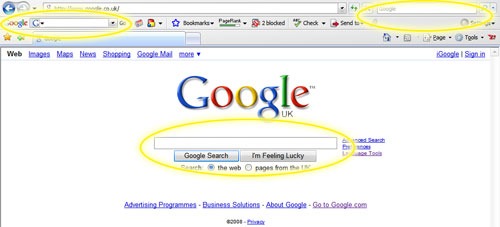By “normal people” I mean those who are mere computer users, not literates nor enthusiasts nor experts. Cabel shares a striking example: in Japan, advertisers instruct potential buyers to enter specific keywords into search engines instead of their company URLs.
Clearly, a sufficient amount of search engine optimization is necessary for this to work, especially for the really famous and common-name brands. But this behavior of accessing websites did not arise because these companies have told us to do so. Neither is it limited to this Asian country.
I am sure you have at least one friend or loved one who has not grasped the concept of URLs and remains highly dependent on Google for finding their way around the web. If you’ll take a closer look at their web browsers, you’ll see why it really isn’t their fault.

Google invades the browsers
Most of the weird behavior we observe from other people is because they have Google as their homepage or built into their browsers. (You can also change the word “Google” to your favorite search engine of choice.) This usually comes in three flavors:
- the Google homepage (whether it’s plain vanilla, a Firefox-Google hybrid, or iGoogle)
- the Google search engine add-on (a common feature in all modern browsers)
- the Google Toolbar
As a result, users now have several blank input bars staring back at them—the address bar, the browser search bar, the Google Toolbar search bar, and the Google homepage search bar. Guess which one they’ll choose?
With the icons and text that draw one’s attention toward the Google search bars, the address bar fades more and more into the background. And since non-techie people are usually afraid of “breaking the computer”, they stick to a method that works well, which is to keep using Google.
Ignore or eradicate?
We can’t blame Google for trying to be the #1 product in our virtual lives; we can only be wary. But it should share the responsibility of educating users of how to use the Internet (how silly does that sound?) with the browsers. Unfortunately neither parties seem to care because: (a) Google would much rather have users search for sites than visit them through URLs directly; and (b) the browsers are earning money precisely because Google is paying them to have their search bars built-in.
Now, learning how to use the interface that lets one use the Internet is only halfway of the journey; choosing to use Google to wade through the Web is not necessarily a bad practice, as Jakob Nielsen predicted that this would become commonplace. But he also believes URLs will have to go.
In the long term, it is not appropriate to require unique words to identify every single entity in the world. That’s not how human language works.
The very nature of URLs seems to be another major stumbling block. Ordinary people don’t understand the use of a “www” and a “.com”, or that the “@” symbol is used only in e-mail addresses. They don’t know how to share websites through URLs either—unless there’s a button with explicit instructions that tell them how.
Add to that the explosion of all the domain suffixes like .me, .travel, and even .xxx. Not to mention all the malicious parties that wish to take advantage of their ignorance—stealing and spoofing personal information through misspelled URLs, search keywords, and deceptive e-mails.
The question is, if normal people aren’t using URLs anymore, what system can be built to replace them? Will it work? Or is Google doing a fine job already?
Originally posted on July 30, 2008 @ 12:56 am